Contents
The table variety Krasavchik attracts attention among other tubers with its attractive appearance. Red-skinned potatoes keep for a long time and are starchy. The variety is productive and unpretentious.
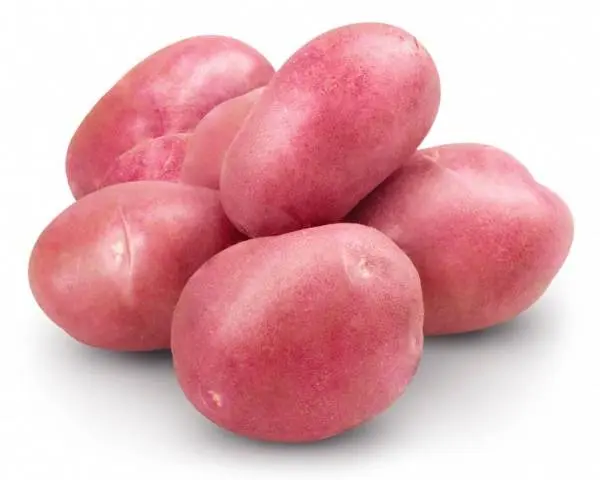
History of origin
The authorship of the variety belongs to the Research Institute of Potato Farming. A. G. Lorkha. Since 2009, the Krasavchik variety has been included in the State Register with recommendations for cultivation in the regions of the Central Black Earth Region. During this time, the new variety spread throughout the country. Now its seeds are offered by farms from the Moscow region, Kaluga, Vladimir, Tyumen regions, Perm region.
Description and characteristics
Mid-early potato Krasavchik enters the phase of technical maturity after 80-90 days of growth. Productivity is 169-201 c/ha. The highest rate was recorded: 284 c/ha. In the nest, 6-11 tubers are formed with an average weight of 90-165 g. The commercial yield of the variety reaches 85-95%. The indicator of keeping quality of tubers is 97%.
Semi-erect, medium-sized bush of the potato variety Handsome of ordinary leafiness. The corollas are white with a slight anthocyanin tinge. The plant tolerates short dry periods well. Oval tubers of the Krasavchik variety covered with a smooth, reddish skin. The eyes are small. Creamy flesh is dense. Due to the solid structure of the pulp, the Krasavchik potato endures mechanical damage and is suitable for transportation.
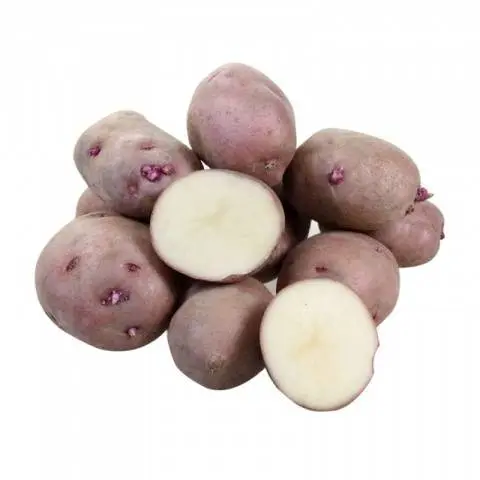
Starch content is high – 12,4-17,8%, but the tubers remain intact during cooking. The taste is pleasant, after heat treatment the pulp is light. The variety is good to use for frying, french fries, salads. Processing industries acquire the Krasavchik variety for the manufacture of chips and dry puree.
Handsome is immune to potato cancer, viral mosaics: striped and wrinkled. The variety is moderately sensitive to infection of tubers and stems with late blight, but susceptible to infection by the golden cyst nematode.
Advantages and disadvantages
Advantages | Disadvantages |
Good taste, classed as high starch (14 to 25%) | Not everyone likes tubers that do not boil soft |
High consumer qualities: beautiful tubers, transportability, keeping quality | Susceptibility to golden nematode |
Excellent trade output |
|
Long dormant period |
|
Resistance to mosaic viruses and potato cancer |
|
Landing
Variety Handsome is suitable for any soil. It is only necessary to determine the acidity of the soil. Potato Krasavchik develops better on soils with an acidity index of 5,0–5,5. Potatoes are planted in fields where fodder grasses, cereals, legumes were grown. They avoid areas where sunflower grew last season, tomatoes and sorghum were grown. For full ripening, potatoes need good lighting of the bushes, so the rows with the Krasavchik variety are located in a southerly direction.
- Acidic soils are limed in autumn: they are applied per 1 sq. m for 500-700 g of lime or 200-300 g of dolomite flour.
- Effective autumn application of 5-10 kg of humus and 60-70 g of superphosphate. Fresh manure is introduced a year earlier, under previous crops.
- Potato tubers Krasavchik are planted according to the scheme 60-70 x 25-30 cm.
- 50-80 g of wood ash are placed in the wells.
The tubers of the Krasavchik variety, selected for planting, must be healthy, without flaws, and elastic. Potatoes are vernalized for 30-40 days at a temperature of 12-15°C, laid out in boxes in 2-3 layers. Light sprouts of the Krasavchik variety are pink. Before planting, the sprouts should grow to 1 cm. Potatoes are planted when the earth warms up to + 8 ° C to a depth of 10 cm. They are sprayed directly in the boxes with growth stimulants and pre-planting insecticides to combat Colorado beetles.
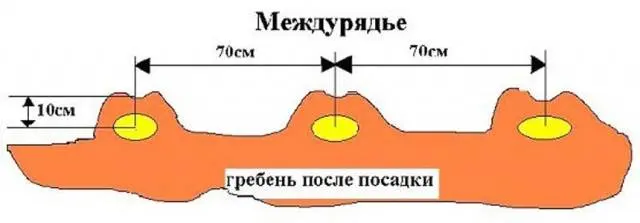
Care
Potato seedlings Handsome are regularly cleaned of weeds and the soil is gently loosened. Watering is carried out when abnormally dry spring weather occurs. Especially potatoes need to moisten the soil to the depth of old tubers, when buds form and after flowering. It is not recommended to water plantings until the stems reach 10-12 cm. 3-6 liters of water are consumed per bush, in hot weather the volume increases to 12-20 liters. Irrigation affects not so much the number of ovaries as the size of the tuber.
Hilling and top dressing
Hilling the bushes two or three times will have a positive effect on the crop. Spud dried, but still wet earth after watering or rain. The first time the height of the ridge is up to 12 cm, the next time it is up to 20 cm. It is recommended to hill the bushes from both sides, without pouring soil into the center of the bush.
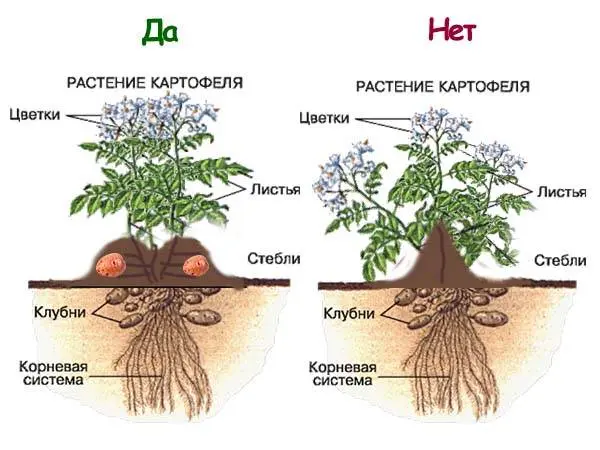
Fertilize the Krasavchik potato variety when the plants reach a height of 15 cm: with urea, mullein or chicken manure. Before flowering, they are fed with wood ash or potassium sulfate, and after – with superphosphate.
Diseases and pests
Diseases/Pests | Evidence | Treatment |
Fitoftoroz | Brown spots on the plant, later a grayish coating appears At a temperature close to + 10 ° C and cloudy weather, in two weeks the fungus spreads throughout the area and destroys the crop | Preventive measures include the treatment of potato bushes with fungicides Tattu, Ridomil Gold, Acrobat MC and others. Folk remedies are used: 200 g of milk or one tablespoon of hydrogen peroxide is mixed with 30 drops of iodine and dissolved in 10 liters of water. Bushes are treated with compositions three times a day |
Black scab, or rhizoctoniosis | Small dark spots on the stems of young sprouts develop into white rot Plants die | The diseased bush is removed and burned. Treat the area with fungicides |
L-potato virus | The tops are light green, the leaves are twisted, then turn pale, break | All tubers are unsuitable for planting and storage. The pathogen is carried by aphids. Spray potatoes from aphids with insecticides or soapy water: 100 g per 10 liters of water |
golden nematode | Microscopic worms live on the roots. The bush turns yellow, the leaves fall, the roots are fibrous | It is necessary to burn the dug up bushes and observe crop rotation |
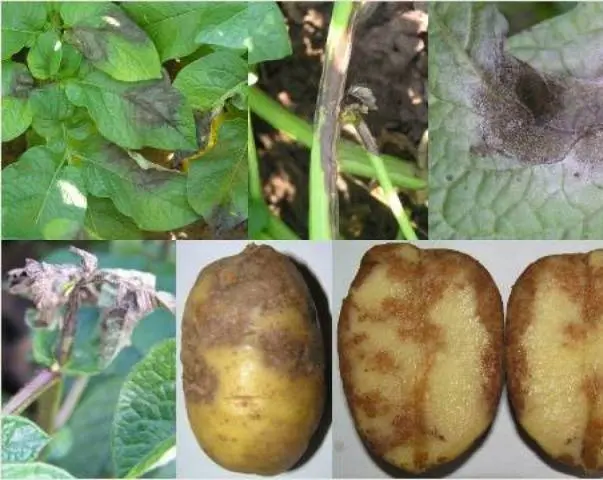
Harvesting
For storage, potatoes of the Krasavchik variety are dug when a dense peel has been created, in the phase of technical maturity. Such tubers are less susceptible to external influences. 20 days before harvesting, the tops are added dropwise, the stems dry out, and the starch goes into the tubers. After 10 days, the tops are mowed, and the tubers ripen. It is advisable to collect in sunny weather so that the tubers of the Krasavchik variety dry for five hours.
Conclusion
The characteristic of the table variety is attractive for growing in household plots and in industrial volumes. Productivity, excellent keeping quality and resistance to some fungal diseases are the components of the successful distribution of the variety. Beautiful appearance, pleasant taste make it in demand among buyers.









